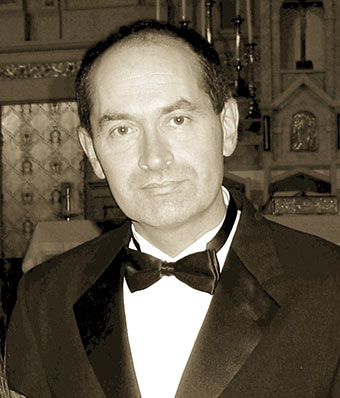Camerata Di Sant' Antonio Opens New Season
by Jan Jezioro

Christopher Weber continues to mix the rare and the familiar
St. Anthony of Padua’s Church behind Buffalo City Hall is once again the site on Thursday, October 21 at 7pm, of the opening concert in the eighth season of the Camerata di Sant’Antonio.
Christopher Weber has been the sole music director of the Camerata since it began in June 2003, at the request of Padre Secondo, pastor of St. Anthony of Padua.“Of course, I am very guarded of my position,” Weber says. “Being conductor of the Camerata di Sant’Antonio is like being head chef for a fine restaurant. I devise the menus and put my stamp of approval on every plate before it goes out of my kitchen. It doesn’t mean that I make better soup than my sous chef, but it does mean that whatever my staff creates has to work in harmony the rest of the featured dishes. The analogy is very apropos, and was passed on to me by my mentor, Frank Collura, with whom I earned my MA in conducting at UC Santa Barbara.”
BPO audiences may remember Collura, who became the youngest member of the BPO when he was appointed assistant principal trumpet at the age of 17, and who went on to become assistant conductor under Michael Tilson Thomas.
Weber is clear about the role of the Camerata: “We strive for each performance to have unique, creative programming that builds audience appreciation and participation, providing cultural enrichment to our listeners by presenting premieres of neglected works. We welcome the opportunity for educational collaboration by including local instrumentalists, singers, and choruses, both professional and amateur. We also try to leverage these intimate musical experiences to create fundraising synergy with local charitable organizations whenever possible.
“We take a great deal of pride in presenting a work that is unknown to our audience, and even to ourselves,” Weber notes. “It’s exciting to rediscover and hear a precious voice that our culture has forgotten.”
The performance by the Camerata of Nachtmusik (Night Music for string orchestra, Op. 7), by Richard Heuberger, may mark the first local performance of any work by the composer. Heuberger (1850-1914) worked professionally as an engineer, and he himself paid for the first performance of Nachtmusik. The work was praised by no less a personality than Eduard Hanslick, the principal classical music critic in Vienna. Heuberger went on to an active career as a composer, conductor, and music critic, becoming identified with the supporters of Brahms, as opposed to those of Wagner, in the musical life of that city. Heuberger later developed a second musical career as an opera composer; the very well-received Opera Ball (1898) was followed by several other successful operas, while his earlier instrumental works were forgotten.
“Paul Schlossman, our oboist, introduced me to a recording of Nachtmusik a few years ago,” Weber says. When it comes to unearthing lost classical treasures, Schlossman, who also serves as the oboist for the Amberg Quartet, has become something of a go-to person in local musical circles. “I made notes on my CD cover that it would be a good first-half closer and periodically listened to the work again, waiting for just the right program to present the piece. I found the Bloch Concerto Grosso to be robust enough to follow it and a perfect foil for the lush Viennese romanticism of the Heuberger. I am not really familiar with Heuberger’s other works, but that’s what’s so wonderful about our concerts. The audience and orchestra both get to rediscover gems of classical music.”
The Camerata has performed Ernest Bloch’s Concerto for Strings and Piano Obbligato previously. “Whenever we perform it, I hear snippets of Buffalo-born composer Harold Arlen’s 1939 score to The Wizard of Oz,” Weber says. “Not the song numbers, but the moody interludes and scene music. I’ve always been fascinated by the mood, lyricism, free meter, and power of the piece, as well as the unique voice of the composer. Bloch’s music was seminal for the ‘American sound’ for which our great composers of the 1930s are famous.”
Weber adds that while the piano’s role is described “as an obbligato, which means it’s obligatory, or indispensable, it’s also far more than that. It’s quite difficult, almost like a concerto, with the exception that the pianist never really gets to play a solo. Ivan Docenko, our pianist, also performed it with us in 2004. He’s a real pleasure to work with: very expressive, an excellent player and improviser and, of course, a good friend—we have a lot of fun.”
The Camerata, which is entirely self-supporting, relies on donors, and to a lesser extent, ticket sales to present its series. “We’re currently working on expanding our audience,” Weber says, “and toward that end we will present a pair of outreach concerts—Solisti di Camerata—this spring, and we hope we can find at least two welcoming venues outside of the city center for these two concerts.”
Tickets are $17. For more information, call 854-2563.
blog comments powered by Disqus|
Issue Navigation> Issue Index > v9n41 (Week of Thursday, October 14) > Camerata Di Sant' Antonio Opens New Season This Week's Issue • Artvoice Daily • Artvoice TV • Events Calendar • Classifieds |









 Current Issue
Current Issue